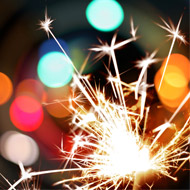Vets urge pet owners to get ‘fireworks ready’

In the last 12 months, some one thousand pets have been treated for fireworks-created issues.
A leading vet charity is urging owners to take immediate action to prevent their pets suffering from extreme distress and trauma triggered by fireworks.
Figures published by the PDSA reveal that owners of eight million dogs and cats report that their pets are afraid of fireworks. In the last 12 months, some one thousand pets have been treated for fireworks-created issues, such as injuries and phobias.
To help pet owners prepare for fireworks season, the PDSA has teamed up with the People’s Postcode Lottery to produce a Fireworks Ready Action Plan. The plan includes the use of pheromones and sound CD’s, how to build a noise-reducing fireworks den for pets and a checklist for the day itself.
“The PDSA Animal Wellbeing Report found that around 40 per cent of UK owners of cats and dogs report that their pet is afraid of fireworks, and anyone who has seen their pet go through this misery knows how serious their anxiety and fear of firework sounds can be,” explained PDSA senior vet Sean Wensley.
“Many shake and tremble, are unable to settle, toilet in the house, destroy furniture, and can even cause themselves physical injury if they panic, try to escape or run away.”
Through its Action Plan, PDSA aims to help pets like Zakk, who received severe but unexplained injuries to his legs after he was spooked by fireworks. Zakk was in the garden when a neighbour suddenly set off fireworks, causing him to panic and leap over the gate.
Zakk was discovered the next day covered in blood and suffering from nasty cuts to his paws. He was taken to a nearby pet hospital for treatment, but the wounds took over a month to heal.
Sean continued: “We don’t know exactly what caused Zakk’s injuries – he could have been hit by a car, or cut himself on something as he panicked. But his story highlights how important it is to be aware of the significance of firework phobia for pets and to know that help is available from your local veterinary practice.”
PDSA’s advice on preparing pets for fireworks can be found at pdsa.org.uk/fireworksready.



 The latest
The latest